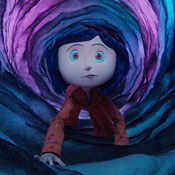- REVIEW
- READER REVIEWS
Coraline
|
(No longer in theaters)
|
|
Genre
Animation, Family
Producer
Bill Mechanic, Mary Sandell
Distributor
Focus Features
Release Date
Feb 6, 2009
Release Notes
Nationwide
Official Website
Review
The film adaptation of a book can be nearly perfect on its own terms and yet subtly off, as in Henry Selick’s exquisite, entrancing, very occasionally enervating movie of Neil Gaiman’s Coraline. Frame by frame, it’s a treat. Selick employs old-fashioned stop-motion animation (Yay! Puppets!) enhanced by computers and extended to the bridge of your nose by state-of-the-art 3-D (in roughly half of all theaters�choose one of those); Bruno Coulais’s music pirouettes nimbly between child-choir enchantment and Night on Bald Mountain dread. You should see it�especially if you’re tired of boisterous animated joke-fests like Bolt and crave a bona fide fairy tale. I feel like a goblin under a bridge when I grumble, but I could have done with a touch less entrancement and a touch more � story.
In his novel (which is stupendous), Gaiman devises an eerie variation on the familiar over-the-rainbow parable: A lonely little girl, transplanted to a rambling old country house and neglected by her parents, discovers a tunnel in the wall that leads to a parallel universe�where she finds a nearly identical mother and father who dote on her. Indeed, this new world seems to revolve around Coraline: Goodies appear at her command, mice serenade her, flowers rearrange themselves to form her face. But there are hints of malevolence: Her �Other Mother� (as the woman refers to herself) has black buttons in place of eyes and a widening streak of possessiveness. Gradually, we discern the psychological truth. The Other Mother’s overbearing love has nothing to do with the child and everything to do with her demonic need for control. It’s a careful-what-you-wish-for tale with a powerful testimonial to self-reliance.
Gaiman’s prose is plot-driven: The prose is plain, which makes the swerves into fantasy so disarming. He’s artful, but he’s not a stylist, whereas Selick is all style. Breathtaking style, to be sure. Working with the Japanese illustrator Tadahiro Uesugi, Selick comes up with a look that’s part Tim Burton (Coraline’s elongated house is right out of Beetlejuice), part Pinocchio. The sets are like dollhouses that open up and float you in. The puppets have wide, smooth faces on stick legs and necks, and their barely perceptible jerkiness makes the movie feel lovingly handmade. Coraline’s features under her turquoise hair are simple yet beautifully articulated: Watch her face when she sees Other Mother for the first time�and how it contrasts with the less mobile, masklike visage of the scarily familiar alien.
As I drank in the phantasmagoria, the surreal music-hall routine, the flower dances, the giant grasshopper ride, the heroine’s endless prowls around artificial landscapes, I kept wondering what I was missing. It might be as basic as emotional focus. The pace is barely varied, and instead of becoming a spitfire detective (as in the book), Coraline drifts around in a daze. Selick saddles her with a playmate�a curly-haired boy with a souped-up, sci-fi-worthy scooter�and her initial impatience with him makes no dramatic sense: It’s the lack of contact with kids that helps drive her into that alternate universe. Selick botches the climax by having the boy roar back and deprive Coraline of her ultimate triumph. Did he need a male character to keep this from being a, you know, girl picture?
Selick has a great fantasy filmmaker’s artistry, but he lacks that overflowing Geppetto-esque love that brings puppets to life. In Coraline, he’s woozy with his own lyricism.
